Graham Reid | | 8 min read
The Rolling Stones: Hey Negrita (from Black and Blue, 1976)
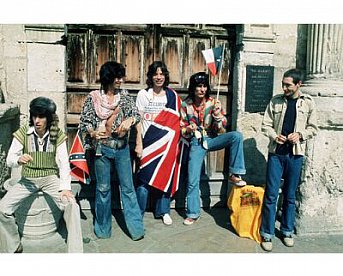
When Virgin Records paid about US$50 million for a slice of the Rolling Stones back in 1991 they were investing in the past more than the future.
That’s with all due respect to the legend that is Jagger-Richards -- a collective proper noun appropriate given their separate solo careers have been abject commercial failures and largely artistic nadirs for both.
No one in their right mind would have shelled out that much money (and that was when a dollar was worth a dollar) for new albums by middle-aged men working in youth culture, regardless of encouraging baby boomer demographic projections.
Did Virgin seriously think people in their “should-we-get-new-carpets” years would go out and buy a new Stones album in the Nineties? These people didn’t have rowdy parties -- and if they did it wouldn’t be a new Stones album they would play, none of their friends would know the words.
Nope, Virgin was investing in the past. It bought the back-catalogue (or the history, depending on how generous you are) to exploit in ads, repackaging, greatest hits collections and so on.
And that is what it did: it quickly put out the poorly packaged but otherwise excellent Jump Back “best of” (released everywhere but the US) -- and then just before the Stones released their new Voodoo Lounge album in ‘94, Virgin reissued most of the catalogue it had bought.
Well, the more things change the more they stay the same. And now Universal is reissuing a swag of the Stones albums from the early Seventies onwards.
These days the Stones are a touring machine and no one would expect any new album to sell: their 2005 album A Bigger Bang has sold around 2.5 million, but as with Voodoo Lounge and Bridges to Babylon (from ‘97), those sales were generated on the back of the subsequent tie-in tours.
So here’s a countdown of what is going to be fed through in the next few months. And some of it isn’t half bad, even three decades on.

Sticky Fingers (1971): The story begins here with Keith’s opening chord on Brown Sugar, a signature sound that resonates even now. The functioning Stones here are really the two Micks (Jagger and guitarist Taylor) with Bill and Charlie as their ever-reliable and staunch posse-cum-rhythm section . . . And Keith? In places he’s more like a ghostly presence on rhythm guitar. Wrapped in a cover designed by Andy Warhol, the album was certainly an attention-getter (the current re-issue doesn‘t duplicate an actual zipper like the Virgin reissue).
The Stones were lurching into the new decade on the back of the enormously successful Let It Bleed of ’69 which was not only a critical success but a chart-topping follow-up to Beggar’s Banquet which had been their return to bluesy, rock’n’roll form in the hazy, psychedelic days of the late Sixties.
Recorded in part at Muscle Shoals and at Jagger’s UK estate, this was their first album on their own label Rolling Stones Records.
The party-stagger hits on Sticky Fingers till stand up (Brown Sugar, Bitch) -- but the sideways slip into darker territory is in the bleak and weary Wild Horses and Sister Morphine. Taylor’s mercurial guitar in the extended Can’t You Hear Me Knockin’ sounds like it has stepped straight off a San Francisco trippy album from ‘68.
And as on Beggar’s Banquet they go right back to their roots for an acoustic cover of Fred McDowell’s You Gotta Move and the tired I Got The Blues, but indulge in their current interest in country-rock on Dead Flowers.
It’s an eerie, sometimes brilliant Stones album (Moonlight Mile sounds utterly contemporary) and everything the critics claimed for it.

Exile on Main Street (1972): Generally and genuinely considered one of the best double albums of all time (no one argues about getting this down to a single album as they do about The Beatles’ White Album), but critically derided at the time for its patchwork and sometimes slipshod quality. But that has been a great part of its cachet: the Black Crowes and the Quireboys would have killed to be this loose -- but they learned the blooze another step removed from these white bo’ originators and when Mick’n’Keef hit Hip Shake (the most studied track on a very stoned Stones album) they are unbeatable.
Recorded over many months which ran into a year and more -- much of it at Richards’ home Nellcote in the South of France where the band had relocated as tax exiles -- there is a ramshackle, dishevelled quality which works in its favour everywhere. A great album -- and it’s got Happy, one of those joyously spontaneous Richards knock-offs.
A mash of rock’n’roll, Robert Johnson blues, odd country, Stax soul influences and garageband thrash, this was a collection of material more than a cohesive album and even today Jagger says he doesn’t like it. Maybe because he -- like Wyman and Watts -- weren’t really there for much of it. Richards, despite his increasing heroin habit, was in control for much of the Nellcote period, and it shows.
It is going to be reissued later in the year with some special marketing push, which makes sense. Maybe it will come with extra material recorded at the time (there was oceans of it, possibly even something with Gram Parsons who was one of the many guests/interlopers during this time)?
Yes, the critics love it now -- but don’t let that put you off.
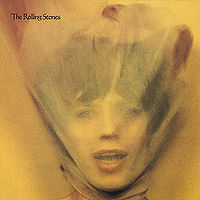
Goats Head Soup (1973): Jagger is enjoyably aloof about his decadent, uncertain years in the early Seventies and admits things got a bit shaky around this time. But this thin-sounding album -- their last with the increasingly debilitated Jimmy Miller -- still has its gems: the coiling menace and stabbing guitars of Heartbreaker, Coming Down Again is one of Richards’ finest visions of post-needle/post-relationship ennui, and the fragile Angie is pretty. Even now.
It seems a shame to have wasted Taylor’s compelling guitar solo on 100 Years Ago on such a lesser, un-aggressive song.
The veiled threat which they did so well on Beggars Banquet and Let It Bleed is somewhat overstated on Dancing with Mr D.
The rest of the album -- Silver Train and Hide Your Love which could have slipped off Exile, Can You Hear the Music and the deliberately contentious Chuck Berry-like Star Star aren’t up to much -- is just there.
However Winter remains an overlooked, country-styled gem.
A workman-like Stones album, and the first hints that the well was drying up.
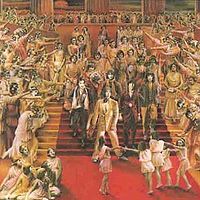
It’s Only Rock’n’Roll (1974): Even now this still seems one of those albums people said they liked more than they actually did. It came with a great title track and epigram/slogan, but it was largely an empty gesture, as was the throwaway opener If You Can’t Rock Me where they come off as some kind of garageland Glitter Band. This seemed to be the Stones (Jagger and Richards produced the album) re-establishing their rock credibility after some dalliances with ballads, funk and country-rock. They even guitar-up the Temptations’ Ain’t Too Proud to Beg.
Till The Next Time We Say Goodbye casts Jagger as some New York boulevard balladeer, and there’s the delicious spinning guitar on Time Waits For No One (both tracks which Taylor says he co-wrote but got no credit for, perhaps leading to this being his last album with the band).
But in other places this sounds a bit locked in its period, and stacked with unmemorable material like Luxury which was yet another rewrite of familiar chord progressions.
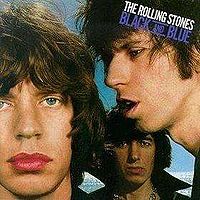
Black and Blue (1976): It was about here critics started to go wrong, and that’s always interesting to watch. This one was largely dismissed at the time as lame, pre-disco clubland dance and the band -- well, Jagger mainly, Richards couldn’t have cared less about now -- as desperate to appear hip and up with the play, as on their Satanic Majesties debacle of a decade earlier. In fact it had, and still has, some great songs: the ragged Hand of Fate driven again by Richard‘s aural fingerprint of choppy chords, the woozily addictive and rambling Memory Motel, the riff’n’rhythm-driven Crazy Mama, the dance cuts of Hey Negrita and Hot Stuff, the late-night groove of Melody with Billy Preston . . .
Even their stab at reggae -- which Richards had fallen for -- on Cherry Oh Baby had the whiff of genuine love and feel for the authentic Jamaican studio sound.
Fool to Cry was their attempt at locating their inner Angie, and isn’t bad at all.
One worth rediscovering, and shamelessly enjoyable. And Ron Wood signed up as the salaried Stone.
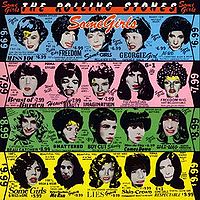
Some Girls (1978): The height of disco and the Stones bravely took it head on with Miss You. And it is still more memorable than most other dance hits of the period. But this was also the time of punk, so they went tough in a Stone-ish rockist way (When the Whip Comes Down, Lies, the stuttering Shattered). They didn’t get punk and couldn’t be punk, but could at least revert to type to conjure up their own rebel status of the early Sixties.
Again they went back to old soul on Just My Imagination.
The title track raised the ire of the politically correct and black leaders like Jesse Jackson but it just sounds silly now (and live they avoid the offending line about black girls) -- that’s the fate of those who court controversy.
The country parody of The Girl With The Faraway Eyes still works on a knowing smile level (country hasn’t change that much) and Respectable is still respectable. Keith sings one of his lesser moments on Before They Make Me Run was which, naturally, received with blind devotion by his legion of fans. It’s pretty awful but watching him singing it live, as he often does, you applaud when he manages to get to the end.
Beast of Burden is worth rediscovering.
Some Girls is a period piece in many ways, but half of it is kinda cracking also.

Emotional Rescue (1980): The Stones closed this decade of diminishing returns with an album which was much loved by fans who heard the rock elements (Where the Boys Go) but in fact it had few redeeming features and flagged that maybe the Eighties just wasn’t going to be their decade (with the exception of parts of Tattoo You in ‘81 that was what happened).
The album sounds unkindly dated (Dance was a repeat play of the Miss You/Hey Negrita effect, Indian Girl a look back to their country material) and aside from the groove-grounded title track just a glance at the other titles reveals how unmemorable it was: can anyone get out three consecutive lines -- or even the tune -- of All About You, Summer Romance or Let Me Go?
Says it all really, doesn’t it.?
The reggae chop of Send It To Me is cool (but Jagger sounds on auto-pilot) however too much here is Stones by rote, even by their falling standards. The track to rediscover is Down in the Hole, although live they have been unnaturally attached to She’s So Cold. And Richards’ All About You is actually a lovely ballad crying out for a cover.
Want more of the Rolling Stones, but earlier? Try The Rolling Stones Reissued, The Sixties: Through the past darkly (again). And for the Stones after the Seventies to now go to The Rolling Stones on CD, 1981 to Now: On with the show . . .

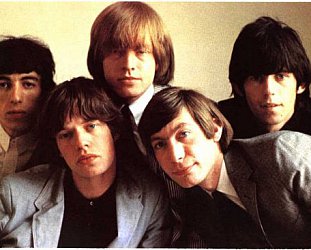




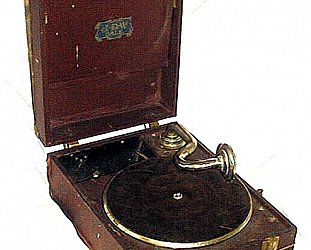
Relic - May 26, 2009
Excellent blow by blow coverage. Black and Blue is a sleeper alright. I am still obessessed by best cover version ever-Just my inmagination-off Some Girls. ’Girls whole sound just so captures the gritty washed out brightness of a speed dawn after a night hard at it.
SaveIt is almost superfluous to comment on these guys, and even unfair, given the deserving artists thronging Elsewhere. Almost. This lot have been majorly responsible for my short attention span for some other genres such as whispered alt. country.
Women by and large steer clear of the misogynist Stones. Yet I have heard a few pretty on to it gals who I assumed would know better, say-that Micks still got it- after seeing Shine a Light. Their saving grace has always been the fact that they are a great blues band, which may give them the opportunity to go out with some genuine dignity as they further age.
post a comment